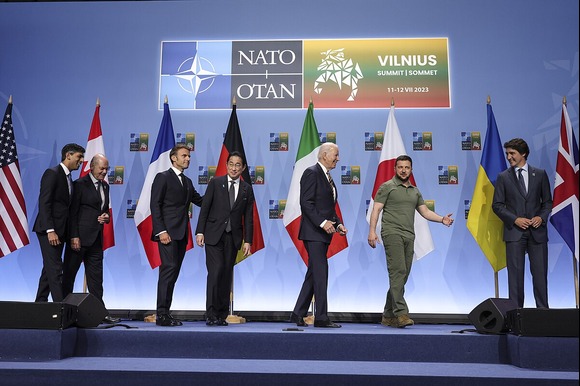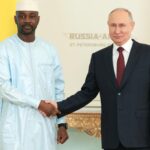German Chancellor Friedrich Merz has issued a stark warning that Russian President Vladimir Putin responds only to the language of force, ahead of a pivotal NATO summit in The Hague. The “historic” gathering, Merz told the German parliament, is set to focus on ensuring peace across Europe for generations, amid heightened tensions with Russia and global geopolitical instability.
Merz reiterated that Putin remains resolute in his ambition to absorb Ukraine into Russia and stressed that Germany is committed to contributing its “fair share” to safeguard European security.
The NATO summit, beginning Tuesday, marks US President Donald Trump’s first since 2019, with all 32 alliance members expected to endorse a bold new commitment: dedicating 3.5% of national GDP to core defence spending, and an additional 1.5% for defence-related infrastructure – amounting to a total of 5%.
Despite the ongoing Israel-Iran conflict casting a shadow over proceedings, NATO Secretary General Mark Rutte urged European allies to stop doubting Washington’s dedication to the alliance. “The US president and senior leadership have total commitment to NATO,” Rutte said, but insisted that such commitment requires matching effort from allies, especially in military expenditure and Ukrainian support.
Rutte highlighted that European countries and Canada had already pledged over $35 billion (£26 billion) in military assistance to Ukraine this year.
On Tuesday, fresh Russian missile attacks killed at least 10 people in Ukraine. Eleven were confirmed dead and 150 wounded following strikes on Dnipro and Samar, with a kindergarten and a passenger train hit in Dnipro. Regional chief Serhiy Lysak confirmed that several children were among the injured. Separately, an earlier attack in Sumy claimed the lives of three people, including one child.
Merz noted that diplomatic efforts to bring Russia to the negotiating table had all failed, reinforcing the need for NATO’s military preparedness. Ukrainian President Volodymyr Zelensky has arrived in The Hague and is set to meet President Trump on the sidelines of the summit — their first meeting since April at Pope Francis’s funeral at the Vatican.
The NATO leaders are expected to endorse a major investment plan that will elevate defence spending benchmarks across the alliance. Though most NATO countries are currently below the longstanding 2% GDP guideline, the proposed targets seek to raise that threshold significantly.
Germany announced on Tuesday that it had reached a budget deal to meet the 3.5% core defence target by 2029. The nation’s defence expenditure will grow from €62.4 billion (£53 billion) in 2025 to €152.8 billion in 2029, partially financed through debt and designated special funds.
“We’re not doing this as a favour to the US or its president,” Merz emphasized. “We are acting out of our own conviction, because Russia is actively and aggressively threatening the security and freedom of the entire Euro-Atlantic region.”
During the summit, Merz is also scheduled to hold bilateral meetings with UK Prime Minister Sir Keir Starmer and French President Emmanuel Macron.
NATO Secretary General Rutte has devoted much of his time since assuming the role to persuading member states to adopt the 5% target — a figure more than double the alliance’s current recommendation and initially seen as implausible when proposed by President Trump in January.
To accommodate the US president, the summit has been compressed into a dinner on Tuesday hosted by the Dutch king and a brief working session on Wednesday. A concise, five-paragraph communiqué will be issued, with the wording of the new defence pledge a critical focal point.
The breakdown of the 5% target involves 3.5% for core military requirements and 1.5% for broader “defence-related expenditure” — a deliberately flexible category that can include cybersecurity, infrastructure, and other adjacent investments.
Meeting the 3.5% target alone represents a substantial leap for most NATO countries. Of the alliance’s 32 members, 27 currently allocate less than 3% of their GDP to defence, with eight falling significantly below the existing 2% guideline adopted in 2014.
UK Prime Minister Keir Starmer committed on Monday to reaching the full 5% target by 2035. The UK currently plans to hit 2.6% for core defence in the next two years, alongside 1.5% for related areas.
Starmer said the UK must respond to a period of “radical uncertainty” with agility and clarity of purpose rooted in national interest.
At the other end of the spectrum is Spain, with defence spending at just under 1.3% of GDP. To meet NATO’s proposed target, Spain would need to more than double its budget — a politically sensitive issue for Socialist Prime Minister Pedro Sánchez. His government, already fragile, faces significant resistance within its left-wing coalition.
On Sunday, Sánchez claimed to have secured an exemption from the target. However, Secretary General Rutte quickly refuted this. “NATO is absolutely convinced Spain will have to spend 3.5% to get there,” he stated.
Sánchez’s remarks prompted Belgium and Slovakia to also float the possibility of exceptions. Belgium, currently at 1.3% spending, has been pushing for “flexibility mechanisms” in recent weeks, according to Foreign Minister Maxime Prévot. Slovakia also said it would determine its own timeline for meeting the target.
Despite these objections, all 32 NATO members are expected to formally sign on to the new spending pledge.
Complicating matters further, transport at Schiphol Airport near Amsterdam was severely disrupted as NATO leaders and global partners arrived in the Netherlands. A fire damaged key railway cables, and officials have not ruled out foul play.
“It could be an activist group, it could be another country. It could be anything,” said Security Minister David Van Weel in an interview with NOS, the Dutch public broadcaster. “The most important thing now is to repair the cables and get traffic moving again.”






